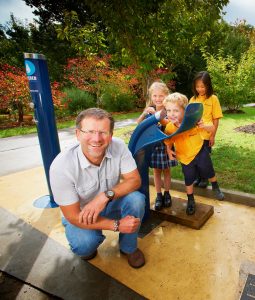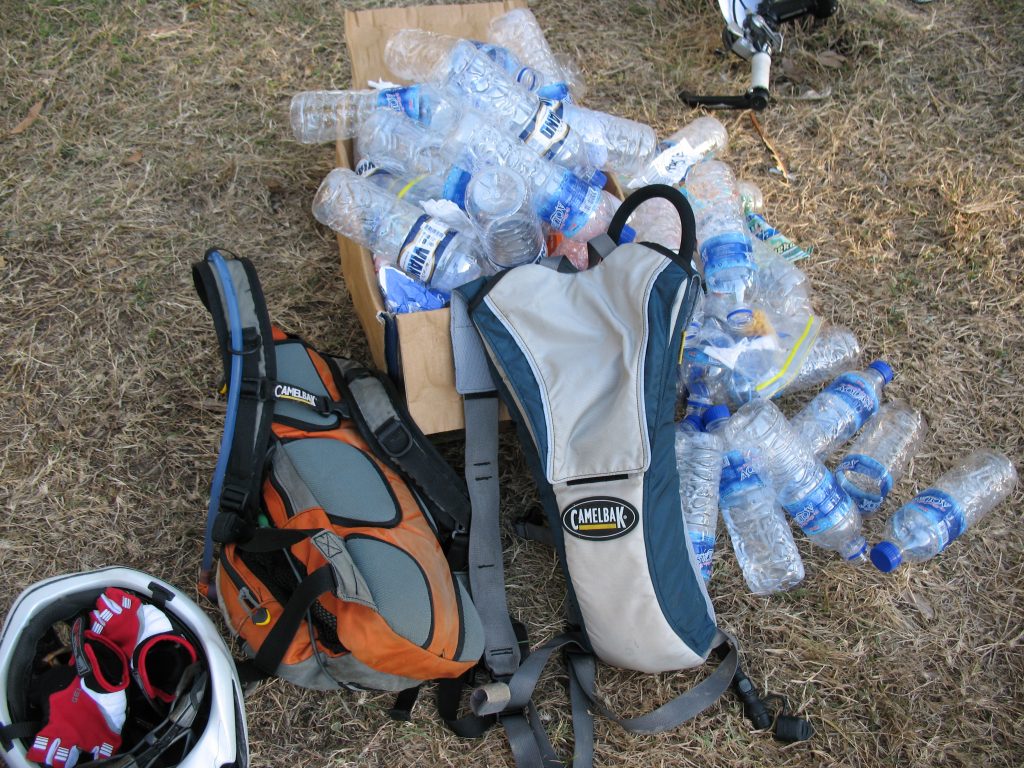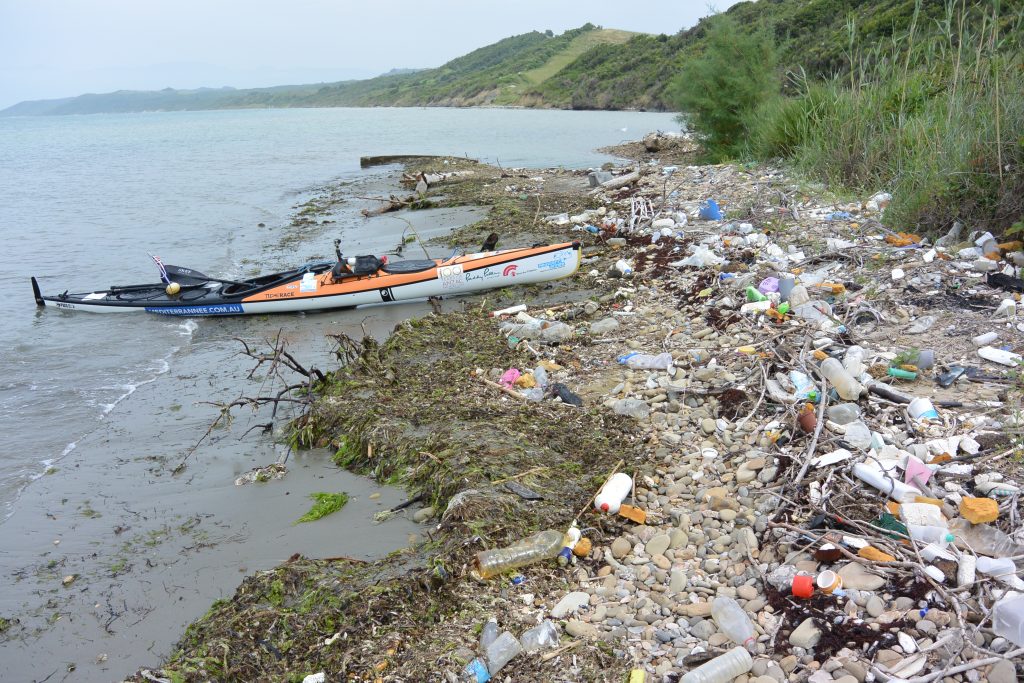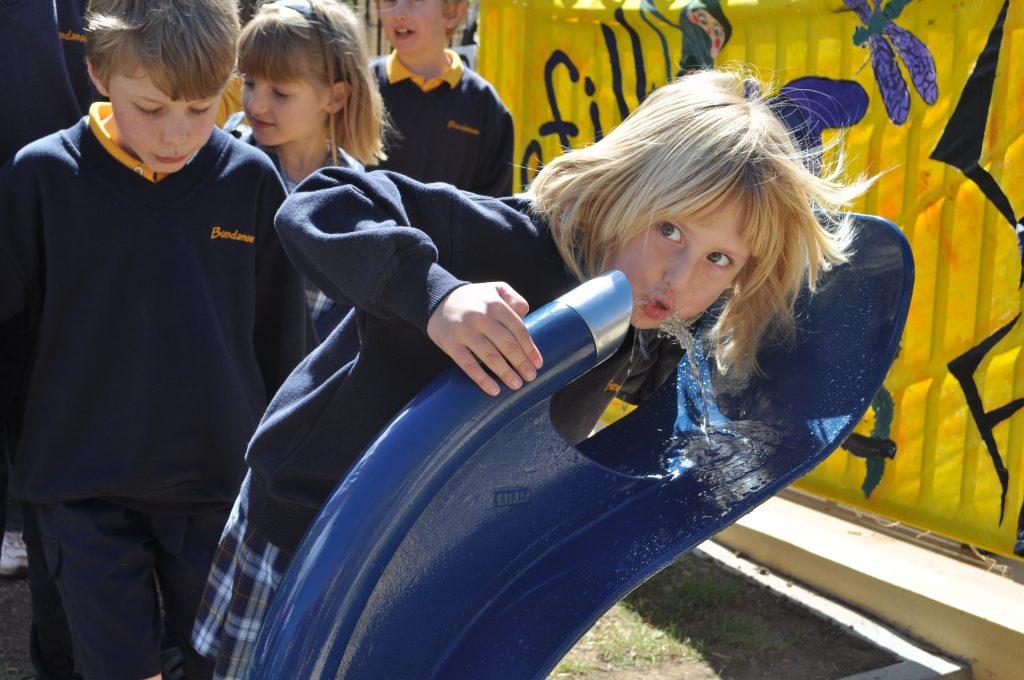Whether undertaking a human-powered circumnavigation of the Mediterranean Sea, traveling between all of Australia’s capital cities, or completing the longest ski traverse in the Himalayas at the time, Adventure Travel Trade Association (ATTA) member Huw Kingston’s ventures are often undertaken on an oversized scale. But the more he immerses himself in his travels, the more his efforts have reflected a philanthropic focus and desire to improve the planet so that others may also enjoy it. Perhaps it is unsurprising, then, that Kingston became the driving force behind establishing the world’s first town to completely eliminate bottled water. With the world celebrating Earth Day on 22 April, this is a particularly fitting time of year to keep in mind how powerful a single person's actions can be to help preserve and protect the planet.

An active member of the media, Kingston has also run Wild Horizons for 25 years, organizing, hosting, and leading large-scale mountain biking events with more than 2,000 participants and small group mountain biking, skiing, and trekking tours. “In a general sense, my time over many decades exploring beautiful parts of this fragile planet imbued me with a sense of wonder, a sense that could easily be dismayed when seeing the rubbishing of such places, whether mountain, desert, or sea,” Kingston said.
When it came to bottled water, the issue hit particularly close to home in 2009. In Kingston’s hometown of Bundanoon, an Australian town with 2,000 people situated in the Southern Highlands of New South Wales, a company had plans to extract water from an aquifer located on the edge of a nearby national park. Kingston joined a community campaign to oppose the extraction plant and wrote an article for a local magazine floating the idea that, if the community was against the extraction plant, perhaps it should make a commitment to rid the town of bottled water for good.
Kingston’s article resonated significantly with locals, who were invested in keeping the extraction plant at bay. A group of researchers, graphic designers, business owners, and other local leaders strategized on how to encourage initiative adoption on a city-wide level, and, most importantly, how to get businesses on board that currently sold bottled water. “We were asking them to give up revenue, and it is never easy to run a small business in a small town. People likened the move to a town going plastic bag-free, but plastic bags are a cost to a business, not a revenue stream,” he said. At the time, Kingston also owned one of the businesses in town (a bike shop and cafe), lending credibility to the cause as a business owner as well as a concerned community member.

Considering the effect giving up bottled water could have on these businesses, the working group developed plans for the project, Bundy on Tap, and identified four main things that needed to be addressed in order to bring this initiative to life:
- Encouraging community members to support businesses in town by shopping locally.
- Installing drinking water fountains throughout Bundanoon as an alternative to bottled water.
- Providing a revenue stream for businesses by buying refillable bottles from them.
- Conjuring up a bit of media interest to help promote tourism in the town.
Though a source of pride for Bundanoon — and a massive milestone for environmental conservation — Bundy on Tap has not been without its struggles. During the community’s campaign to become free of plastic water bottles, representatives from the world’s most dominant players in the bottled water industry responded swiftly by putting out “lightly” sparkling water, which had a few bubbles, and claiming the town was restricting people’s freedom to choose. After Bundanoon officially became the world’s first bottled water-free town, the bottled water industry paid for young adults from the United States to travel to Australia with the purpose of making YouTube videos poking fun at the town’s achievements.
Bundanoon has remained free from plastic bottles to this day, and other cities across the globe have also fallen into step. To varying degrees, bottled water has been banned in several Canadian municipalities, a few cities in Massachusetts, at the University of Vermont, in the Indian states of Bihar and Sikkim, and in San Francisco. Bottled water was banned from 23 U.S. National Parks under a 2011 action put in place by former U.S. President Barack Obama, but was reversed in August 2017 by President Donald Trump.

In cities and countries where tap water is accessible and safe, bottled water is a discretionary purchase, and the biggest battles are fought against multinational companies whose sole interest is in padding the bottom line for shareholders. But Kingston pointed out there are perfectly good reasons why much of the world’s population — especially those in lower income, developing nations — drinks bottled water. “Here, to some extent, governments have abrogated responsibility for the provision of clean municipal drinking water supplies due, in part, to the prevalence of relatively cheap bottled water in those places. This has meant that the bulk of the population of those countries turn to bottled water for their drinking water, creating a massive waste stream in countries that often have poor levels of recycling,” he said.
Kingston also notes recycling itself has become an excuse to use plastic bottles, but many people are unaware of how many resources are used in not only manufacturing and transporting these bottles prior to use but then collecting, recycling, transporting, and repurposing them afterward. “We need to move beyond the mantra that recycling is somehow a solution,” he said.
While Bundanoon is a success story among the massive plastic waste in the world, Kingston explains this is in part due to the fact this was a small town with an engaged community and only a handful of businesses. It is far better to educate people about the problems associated with bottled water and plastic bottles, and install drinking fountains so they become the norm. “People then have a clear choice on a hot day: Drink from a fountain or refill a bottle from it. This will help limit the impact versus buying a single-use plastic bottle of water with all its attendant problems,” Kingston said. “Generally this is the path I advise communities to go down.”
But for tour operators working on the frontlines of an industry that has the potential to plow through single-use plastic bottles, the power to eliminate bottled water is absolutely achievable. Start with clients. Explain what the company philosophy is regarding single-use plastic water bottles and why. Bust myths about destinations perceived to have unsafe tap water, and take the time to understand the actual situation regarding the water supply in the countries in which tours are offered. In destinations with questionable tap water, provide clients with filtered water bottles to use.

Work with suppliers willing to comply with a requirement that no bottled water is to be used. This includes telling hotels and restaurants not to offer bottled water. “In much of Europe, it is traditional to plonk a few bottles on the dinner table. Ask them not to do so, but to provide jugs of tap water instead,” Kingston said. Additionally, keep in mind that an increasing number of consumers — particularly Millennials and Generation Z — are interested and willing to invest more in purpose-driven brands. For adventure tour operators that have eliminated single-use plastic bottles as part of their business models, don’t be afraid to share the message far and wide, and to encourage other companies to follow the lead.
Kingston said he believes people are finally realizing how much damage plastic bottles are having on the world’s ecosystems, but the situation remains dire. “Like climate change, it is now such a massive global issue that only concerted efforts across the world can do something to solve it. But it is concerted efforts by millions of individuals, not a reliance on government,” he said. “I’m certainly proud of the small part our little Australian town, in becoming the world’s first bottled water-free town, has played in showing the world you can take steps without, in any meaningful way, affecting your day-to-day life.”
Kingston will be attending AdventureNEXT Near East in Jordan 7-9 May and welcomes the opportunity to talk in further detail about his efforts to eliminate single-use plastic water bottles with other attending delegates.
